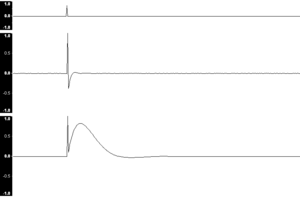
Back ቅፅበታዊ ምላሽ Amharic استجابة نبضية Arabic Resposta a l'impuls Catalan Impulsní charakteristika Czech Impulsantwort German Respuesta a impulso Spanish Impulsskoste Estonian پاسخ ضربه Persian Impulssi- ja askelvaste Finnish Réponse impulsionnelle French

In signal processing and control theory, the impulse response, or impulse response function (IRF), of a dynamic system is its output when presented with a brief input signal, called an impulse (δ(t)). More generally, an impulse response is the reaction of any dynamic system in response to some external change. In both cases, the impulse response describes the reaction of the system as a function of time (or possibly as a function of some other independent variable that parameterizes the dynamic behavior of the system).
In all these cases, the dynamic system and its impulse response may be actual physical objects, or may be mathematical systems of equations describing such objects.
Since the impulse function contains all frequencies (see the Fourier transform of the Dirac delta function, showing infinite frequency bandwidth that the Dirac delta function has), the impulse response defines the response of a linear time-invariant system for all frequencies.
© MMXXIII Rich X Search. We shall prevail. All rights reserved. Rich X Search